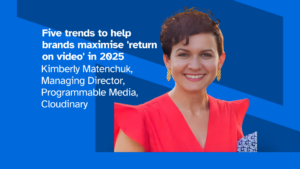By Brad Rees, CEO Mediacells
Advertising agencies, production companies and rights holders agree on at least one thing – AI is the train you cannot afford to miss – but as with every mindbending new piece of technology, there are a few false starts out of the station.
It is surely no revelation that the Gen Z tribe use AI to find stuff out instead of the perceived ageing action of using a search engine to obtain facts.
Similarly, the same cohort is barely active on Facebook, occasionally posting ‘Happy Birthday Nan’ or throwing out a Like, a Love or a Care to a cousin’s graduation pic, powered by an emoji-manic boomer parent.
According to new research released by tech website The Verge and mass media outfit Vox Media, only 32% of Boomers trust the veracity of information that AI provides, while 63% of Millennials and 53% of Gen Z are more believing.
Before Google, we got our information from encyclopedias and dictionaries, books, libraries, newspapers and magazines, TV and radio, experts and professionals, by word of mouth, through physical travel and exploration, even telephone directories- and we still use these knowledge tools, apart from the BT Phone Book which finally hung up on us last month, after 140 years.
AI attracts both Doomers and Bloomers; those who see the proliferation of artificial intelligence as another nail in the humanity coffin and others who think it’s what the world has long been waiting for.
Just as Google was able to retrieve results on the current whereabouts of obscure 1960s garage rock bands’ so too does AI promise to solve that Netflix family endless debate about what to watch – with 62% of 2k respondents agreeing AI is better at planning family activities, though thankfully not yet family planning activities!
Of course, AI can do a better job at the routine and mundane for us all but it is in the digital creator economy where it is being warmly embraced.
Nearly three-quarters of Gen Z and Millennials surveyed said they use AI to create audio, photos, and video using applications like Adobe’s new AI-powered Premiere Pro and Photoshop.
A little less of the same cohorts said they use it for design assistance – probably because the perceived target audience wants more visceral, authentic, rough-cut content, for now at least.
In its first mainstream year, mid-2022 to 2023, the impact of AI trended away from creativity in favour of productivity. We can all see this in how we interact with AI to compose or reply to emails, LinkedIn posts and all.
Creativity and productivity are not exclusive to one another as anyone who has tried to promote a sponsored run, a local gig or amateur dramatic social media promotion can attest.
No surprise then that 82% of digital creators said that AI helps them analyse their content strategy, e.g. what’s hot/not. Nearly the same amount relies on AI to discover additional audiences to tailor content for and generate multiple types of videos from the same source content as well as editing, A/B testing and analysing of content performance and to a lesser but still significant extent, brainstoming content ideas through trends analysis.
There is simultaneously a micro-boom in nascent AI tools for creators and their agents who hunt derivatives of their original art, literature, and music in AI-generated content.
Eight daily newspapers, including The New York Times, are suing OpenAI and Microsoft for “copyright infringement, accusing them of using copyrighted articles to train chatbots that then competed with the paper as a source of news and information.”
It is not just fusty old newspapers who should be worrying about plagiarism. In entertainment and sports, industries notorious for chasing younger advertising dollars, the perfect FUBAR storm could soon await.
If Millennials, two thirds of whom trust the veracity of AI, were presented with deep fake re-enactments of English Premier League football matches e.g. Coventry City visually rigged to beat Manchester United on penalties to reach the FA Cup final against Manchester City on 25th May – would it matter as long as it suited the target fan base?
Or could media manipulations of pro-sustainability actors’ voices to sell fast fashion items on TikTok pass muster as long as a particular audience itch was scratched?
The good news is that 3 out of 4 consumers continue to demand transparency, believing that regulations and laws need to be developed specifically around AI.
AI models should be trained on datasets that have been checked for authenticity, digital content should continue to have to clearly state if it is created by AI and video and audio deep fakes should be illegal to create if it imitates a real person without that person’s consent, according to the Verge and Vox survey.
Further good news for content owners and their agencies is that Gen Z, who are overtaking Millennials and Boomers as the world’s largest consumer group, demand ethical policies from their brands, especially around sustainability, mental health awareness and transparency.
As audiences gravitate to AI-supported personalised content, where every single interaction is pre-ordained – the boffins in charge of brand SEO and SEM strategies are evolving from primitive, programmatic keyword modelling to something more Homosapien 3.0, a conversation.
Imagine that, an advertising dialogue.
Just as the arcane British Telecom Phone Book survived the advent of the computer, the mobile phone, the smartphone, the App Store and the internet, perhaps it will be another 140 years before Google makes its final keystroke.









